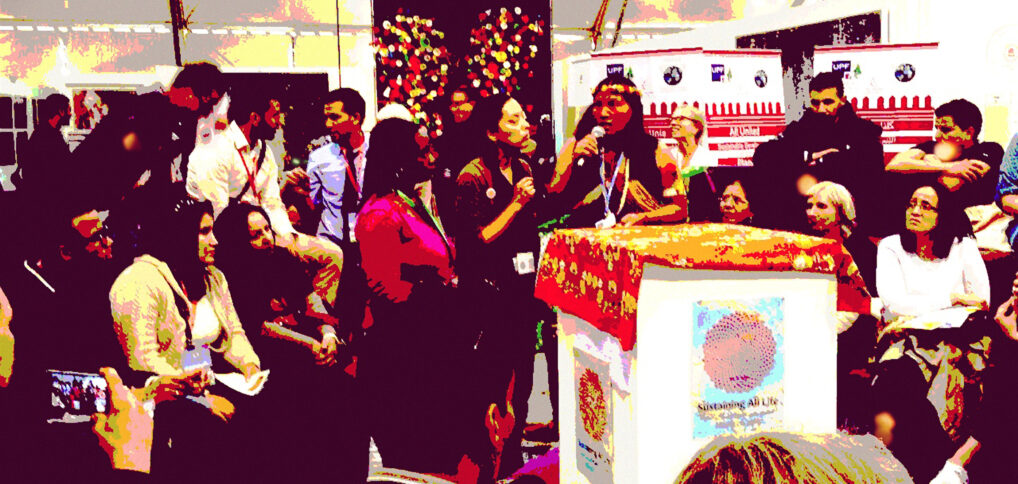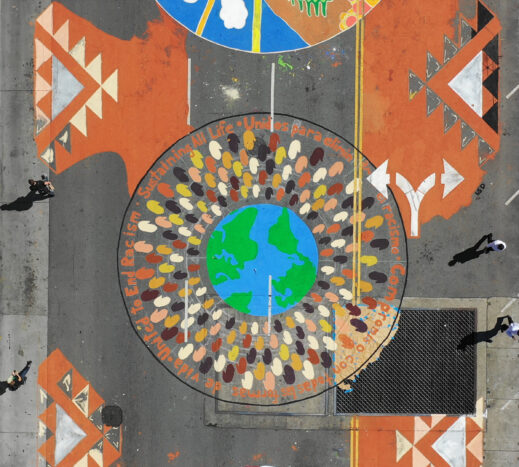
We must end the climate emergency to ensure our long-term survival as a species. But those of us working to end it face a challenging situation. Climate change is accelerating, and the people with power to set policy are failing to address the root causes—few governments are taking large enough meaningful steps. Our movements face well-funded opposition, and decades of lies about climate change have slowed our movements’ growth. We also face other challenges besides the climate—wars, genocide, racism, other oppressions, pandemics, economic struggles—so we’re having to work on many fronts at the same time.
However, our movements are now growing. More and more people are getting involved. Climate extremes are being publicized. People are also experiencing the situation personally and becoming more open to new ideas. And we keep coming up with new and better solutions. We have countless opportunities now to reach people with our message about the need for, and possibilities for, change.
IT HELPS TO BE HOPEFUL
For us to stay engaged, it helps to be hopeful. Feelings of despair and hopelessness can confuse us and cloud our thinking. Of course we can act whether we feel hopeful or not—and it makes sense to do so—but when we are hopeful, we have more access to our thinking and can better help others to see the possibilities.
Most people if they are to take action need hope for the future. If we have a hopeful tone and perspective, we can bring people along with us. It appears that the climate crisis will get worse for many years. We want to help people understand why it makes sense to stay engaged when the news is bad.
For all these reasons, it is time to reclaim our hope and have a strategy for staying hopeful in the face of difficult times.
WE HAVE REASONS TO BE HOPEFUL
Our situation is difficult, but we have reasons to be hopeful: We live on a beautiful planet. Millions of lifeforms exist with us. Each of us humans is precious and unique. We have the capacity to love one another across any barrier, cooperate to meet huge challenges, think our way through complex situations, and celebrate our many accomplishments and relationships. Billions of acts of kindness, caring, support, intelligence, and courage are happening every day.
Humans created the climate emergency, and humans can solve it. We even know what to do to solve it, and the solutions are within our reach! We simply need to bring enough people along as we make demands that can’t be ignored.
MAKING CHANGE BUILDS STRENGTH AND HOPE
Real change, small and large, is possible. Here are some things we can do in our own communities:
• We can protect natural carbon sinks (forests, wetlands, peat bogs).
• We can work for extensive public transportation.
• We can support publicly owned renewable energy projects.
• We can end fracking and fossil fuel extraction.
Organizing for local change builds our strength and creates a base from which to join with global efforts. And local successes bring hope.
WE CAN HEAL THE HURTS AND STAY HOPEFUL
In Sustaining All Life (SAL) and United to End Racism (UER), we have learned that feelings of despair and hopelessness are rooted in earlier experiences. Young humans arrive in a world full of challenges. Every young person wants to be part of making things right, but children are small and adults disregard their efforts. Therefore, as children we often felt discouraged about making change. Then continuing experiences of oppression further diminished our sense of ourselves. As a result, few of us end up thinking of ourselves as agents of change.
.In SAL/UER we work to free ourselves from the effects of past hurtful incidents so they do not limit our future. We have found that we can heal from our hurts if someone listens to us attentively and allows and encourages us to express our grief, fear, and other painful emotions—using the inherent healing process that all humans possess. The outward signs of this process are talking, crying, trembling, expressing anger, and laughing. When we use it intentionally, in a supportive network, we can stay united, hopeful, thoughtful, joyful, and committed. This strengthens us in building our movements to end the climate crisis, and all oppression.
In SAL/UER we listen awarely to each other in pairs (listening exchanges) and groups (listening circles) and express our painful emotions. We talk about times when we got discouraged when we were young, or last week. Having an ongoing group in which to do this on a regular basis makes an important difference to our well-being and functioning. If you’d like to find a such a group near you, or build your own, SAL/UER can help.
Many of us feel more hopeful when we take action to end the climate emergency, especially when we do it together with others. It pulls us out of feeling resigned and alone and leads to fresh ideas and new relationships. Taking action for change also makes our healing processes more accessible.
Some of us are drawn to reading the same bad news over and over—not for information but compulsively. Having someone listen to us can help us break this habit. Paying attention to and talking about hopeful developments is much more fruitful, and can also help us release the hopeless feelings that come from old painful experiences.
We don’t want to pretend that the climate crisis isn’t dire or claim that we’re certain we can solve it. We don’t actually know how things will turn out, but that’s not a reason for despair. It’s a reason to stay thinking, connected to others, and engaged in doing what’s possible.
If we heal emotionally as the climate emergency develops, we will be more able to find strategies that fit the situation, and to do what makes sense, while keeping a hopeful perspective.
We can do hard things. We can face whatever needs to be faced. We are part of a global network of people working to end the climate emergency.
What makes you feel hopeful today? What actions can you take to help you stay hopeful? How can you bring your hopeful perspective to others?


